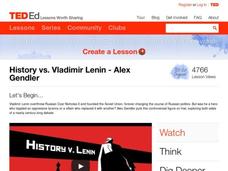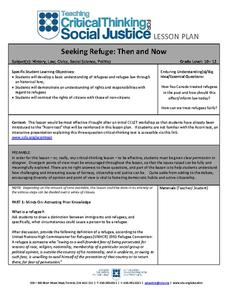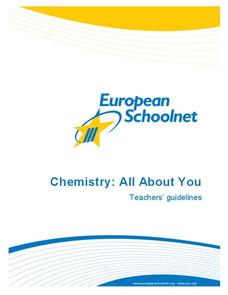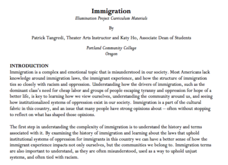Curated OER
Why Do Governments Exist? Locke, Hobbes, Montesquieu, and Rousseau
Here is a great secondary source reading that includes the primary ideas and philosophies of the famed Enlightenment philosophers: Thomas Hobbes, John Locke, Charles Montesquieu, and Jean-Jacques Rousseau. In additional to discussing...
TED-Ed
History vs. Vladimir Lenin
Vladimir Lenin is on trial in an engaging, animated video where the merits and consequences of the formation of the Soviet Union and Lenin's actions are reviewed. This is a great way to illustrate how to establish and argue unique...
Berkshire Museum
Backyard Rocks
You don't have to travel far to learn about rocks, just step outside, pick up a stone, and begin investigating. After taking a class walk around the school grounds collecting rocks, young scientists practice their skills of observation...
iCivics
You've Got Rights!
If aliens invaders nearly destroy the world in the distant future and leaders must decide on a pamphlet of protections to preserve individual rights, what should they include? Introduce the Bill of Rights and the struggle between the...
Federal Reserve Bank
Monetary and Fiscal Policy in Times of Crisis
Following the 2008 financial crisis in the United States, why did fiscal policymakers increase government spending and reduce taxes? Discover the motivation behind these actions and learn about the separate functions of monetary and...
Federal Reserve Bank
Choices Are Everywhere: Why Can’t We Just Have It All?
Here is a resource covering a range of terms and concepts regarding scarcity, opportunity cost, and government debt in economics.
Federal Reserve Bank
Credit Cards - A Package Deal
Arm your learners with the information they will need to make smart decisions regarding credit cards and personal savings.
North Carolina Consortium for Middle East Studies
Federalists v. Anti‐Federalists
Here is a solid lesson plan to support your instruction on the Continental Congress and the Articles of Confederation. It includes close analysis of primary source images, a guided notes template and answer key, and many key points to...
Curated OER
Our Classroom Constitution
Develop a system of classroom rules created by the kids, for the kids with this three-part lesson series on the US Constitution. After learning about the structure of the Constitution and the government it established, young scholars...
Canadian Civil Liberties Education Trust
Seeking Refuge: Then and Now
Participants examine refugee law and policies and read several case studies to prepare for a discussion of this hot-button issue. The packet includes a wide range of materials representing a variety perspectives.
iCivics
Drafting Board: Electoral College
Should the president of the United States be voted by the Electoral College or the popular vote? Your young historians will consider the pros and cons of the Electoral College, and make an argument using reasons and evidence provided in...
Canadian Civil Liberties Education Trust
That’s Not Fair!
As part of a series of critical thinking exercises, kids consider issues of social justice, especially the factors that must be considered when trying to balance conflicting rights and freedoms.
Curated OER
Parrot in the Oven: Pre-Reading Strategy: 4 Corners
A four corners pre-reading activity introduces class members to the major themes in Victor Martinez's award winning novel, Parrot in the Oven: Mi Vida.
Youth Leadership Initiative
Selecting a President: Primaries and Caucuses
What is a party caucus anyway? And what part do caucuses play in the primaries? Everything future voters need to know about the four stages in the presidential selection process is provided by this resource. The 2012 US Presidential...
PBS
What Are the Primaries and Caucuses?
What are the essential differences between primaries and caucuses? As part of a study of the process by which Americans select their candidates for US president, class members examine the nominating process, the changes that have...
Council for the Curriculum, Examinations and Assessment
Drugs Awareness
Legal and illegal. Use and misuse. Risks and consequences. Myths and facts. Class members investigate the effects on the body of various drugs, including cannabis, nicotine, and alcohol.
Council for the Curriculum, Examinations and Assessment
Learning About Learning
Bloom's Taxonomy and Howard Gardner's Theory of Multiple Intelligences feature largely in a session that asks class members to identify their dominate learning style and intelligence. Furthermore, individuals consider how using these...
Northern Ireland Curriculum
Self Concept
It may not be possible to have control over all aspects of life, but through the activities and discussions in this lesson class members learn different ways to cope with those areas over which they have little or no control.
The New York Times
Dark Materials: Reflecting on Dystopian Themes in Young Adult Literature
The Hunger Games. Maximum Ride. Why is so much of young adult literature so dark? What is the appeal of dystopian literature to young readers? The six activities in this resource ask kids to reflect on some of the reasons this genre has...
European Schoolnet
Chemistry: All About You
Developed for the 100-year anniversary of Marie Curie's Nobel Prize, a book offers lessons and activities to interest scholars in chemistry. It is divided into modules, so you can pick information from each to create your own lesson...
Advocates for Human Rights
Who are Immigrants?
What do Jerry Yang, Patrick Ewing, John Muir, Charlize Theron, Peter Jennings, and Saint Frances X Cabrini all have in common? They are all immigrants to the United States. Famous and not-so-famous immigrants are the focus of a resource...
Constitutional Rights Foundation
Options for Affecting Public Policy
Letter-writing, e-mail and telephone campaigns, petitions, marches, meetings, with lawmakers. Options for influencing elected representatives are the focus of resource that details how to craft each of these approaches to influencing...
Curated OER
Immigration Illumination Project Curriculum Materials
Gain an understanding of the complex topic of immigration with a collection of resources. Class members engage in a series of activities designed to give them insight into the factors that influence immigration policies and the effects...
Reed Novel Studies
Dolphins of the World
Pair a novel study of Island of the Blue Dolphins by Scott O'Dell with a presentation on dolphins. The 37-slide PowerPoint shows different types of dolphins all around the world, includes a brief description of each, and provides a photo...
Other popular searches
- Debate Structure
- Current Events Class Debates
- Death Penalty Debate
- Treaty of Versailles Debate
- Debate Resolutions
- Atomic Bomb Debate
- Air Pollution Debate
- First Amendment Debate
- Genetic Engineering Debate
- Sparta and Athens Debate
- League of Nations Debate
- Abolition Debate

























